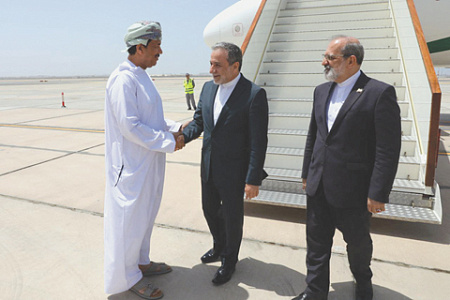
Oman hosted the fourth round of negotiations between the United States and Iran on the nuclear dossier. They were held at a high level in parallel with the consultations of expert groups. Washington and Tehran have resumed diplomatic efforts after a break, which was apparently caused by the fact that the administration of US President Donald Trump has not yet decided on its position on whether the Iranian side will retain the right to minimal uranium enrichment. Iranian diplomats say they no longer expect anything good from the resumed negotiations and are preparing for the worst-case scenarios.
The next round of high-level negotiations between the United States and Iran took place simultaneously with technical consultations of expert groups. This was the fourth meeting organized after a short pause. The previous exchange of views took place on April 26 in Muscat, and then the parties announced a hitch, allegedly due to technical difficulties. As the official representative of the Iranian Foreign Ministry, Esmail Bagai, stated on the eve of the current talks, the diplomats of the Islamic Republic went to Oman with the task of protecting national interests and achieving “preservation of the country’s achievements in the field of peaceful nuclear energy” within the framework of the projected agreements between Washington and Tehran.
As Iranian Foreign Minister Abbas Araghchi stated shortly before the resumed consultations, fluctuations in the US position are still the main stop factor in moving the diplomatic process forward. “The Americans take contradictory positions in the negotiations,” the minister stated. “This is one of the most serious problems of the negotiation process.”
The key contradictions between the parties are related to whether Iran will be able to maintain its uranium enrichment program at such levels that it corresponds to the declared civilian nature of its nuclear program. In an interview with the conservative Breitbart portal, Stephen Witkoff, the US president’s special envoy for the Middle East, once again stated that “the Iranians cannot have a bomb.” According to him, Tehran even agreed with this thesis. “Their enrichment equipment must be dismantled,” the special envoy stressed. “They can’t have centrifuges. And they should switch to a civilian program if they want to develop a civilian program.”
Two days earlier, American Vice President Jay D. Vance assured that Tehran, from Washington’s point of view, could well have civilian nuclear energy. “We are not opposed to this,” he explained. – Our proposal is very simple: we don’t care if people want nuclear power. However, you cannot have the kind of enrichment program that allows you to construct a nuclear warhead. That’s where we draw the line.” According to him, developments around the Iranian atom will hypothetically end either with the Iranians eliminating their nuclear program, which is close to weapons levels, and reaching a workable agreement, or with Tehran eventually receiving a fully equipped nuclear bomb.
Publicly, Trump admits that his administration has not yet made a final decision on whether Iran needs to maintain its uranium enrichment program for civilian purposes. “We have not made this decision yet,” the American leader informed reporters at the White House on May 7. – We will do it (work out a position. – “NG”), but not yet.” The next day, the head of the White House explained that he would like to solve the problem of the Iranian atom “without major bombing” of the territory of the Islamic Republic. “I don’t want that. I want them (the Iranian nation. – “NG”) have achieved great success,” Trump drew attention.
But Iran, apparently, is already tired of adjusting to the changing mood of the American leadership. As CNN reported, citing Iranian sources, Tehran is now preparing for the worst possible scenario. “Political, economic and other circles have prepared the necessary scenarios over the past month,” one of the channel’s interlocutors explained. According to him, the Trump administration is “basically not ready for meaningful technical and political negotiations” with Iran, because its diplomats give “short and general answers” to questions of interest to Tehran, ignore “basic proposals”, and “constantly change their position.” This led the Iranians to assume that the negotiations “would not yield the desired result in terms of sanctions relief and economic benefits,” the source told CNN.
The commander of the Islamic Revolutionary Guard Corps, Lieutenant General Hossein Salami, recently promised that his country would not fail to strike at the positions of the United States or Israel in the Middle East if they decide to resort to force scenarios against Iran. “I am making a serious warning: if you take even one wrong step, we will open the gates of hell for you,” the military commander stressed. “In the event of a threat from the United States against Iran on the issue of nuclear weapons, Iran is ready for confrontation at all levels and in all spheres.”
